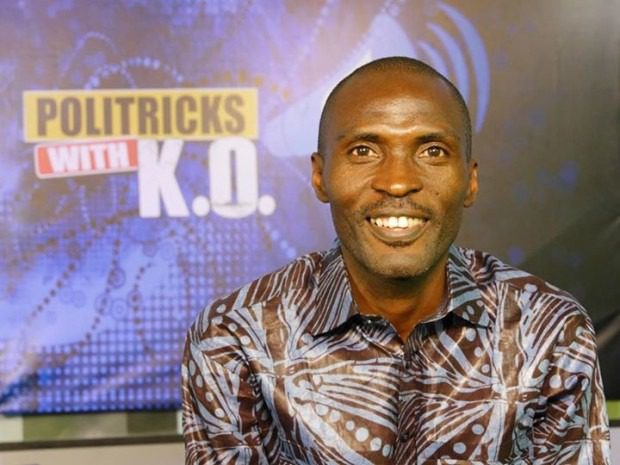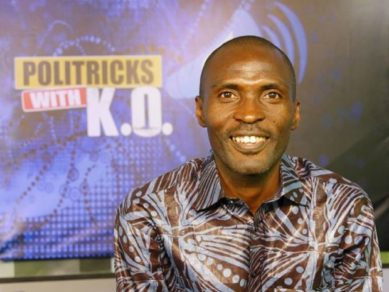National Issues
Exploitation of Internally Displaced Persons in Nigeria -By Kayode Ogundamisi

Dear Vice President Professor Yemi Osinbajo,
Please find below reports from whistle-blowers who contacted me and send daily photographs regarding the condition of Internally Displaced Persons (IDPs) across 17 camps in Borno State. I am informed that your office plays a supervisory role in agencies connected to the welafe of IDPs in Nigeria and I humbly request your urgent intervention.
Forced Relocation
Internally Displaced Persons from the conflict caused by the terrorist group, Boko Haram, are dispersed across various locations in Borno State. Having been forcibly removed from their homes, the IDPs walked miles to find safety and succour in the capital city of Maiduguri. Some walked for days from Monguno, Bama, Kukawa, Ngala, Damasak, Damboa, Jere and a host of small villages spread through Borno State. The number of individuals fleeing from Boko Haram is increasing daily. Due to issues of the unreliability of information, the number of Internally Displaced Persons is inconclusive. But walking to Maiduguri has become the only option they have, and more and more of them are trooping into Maiduguri.
Dashed Hopes
But this mass relocation to Maiduguri has resulted in overpopulation in the already underdeveloped and almost impoverished city haunted by years of bombings. Further compounding these issues is the minimal to almost non-existence of electricity in Maiduguri, closed down businesses, saturated hospitals, and a generally wary populace. The fleeing communities have met a new set of problems in this host city they are moving into. First, they are lodged in secondary schools or uncompleted buildings, where there is no running water, no mosquito nets, and no protection from the harsh elements in a city in which the temperature can go up to 37 degrees Celsius. The camps are overcrowded, run down and are struggling to accommodate the increasing number of displaced people. The living conditions are atrocious, unhealthy, and dangerous. Some IDPs are moving back to their villages out of frustration. And the villages are actually the most dangerous of places to be in at the moment.
Added to the terror of seeing relatives, parents and whole communities killed, the camps they are currently lodged in exposes them to the possibility of further exploitation, and they are open to all sorts of threats. Most camps are unguarded. The camp in Dalori is close to Konduga, a dangerous territory close to Sambisa Forest. The camp in the Government Girls Secondary School, Maiduguri has better security as it is in the centre of town. Other camps aren’t faring well.
Health
Malnutrition in both adults and children is occurring at alarming rates in the camps. The worst affected are children. Arriving with other health conditions, mental and physical, children are exhibiting worrying signs malnutrition. These signs and symptoms were recorded in an April 2015 UNICEF report, “Missing Childhoods”. The report states the children in the camps showed back then an 18 level threshold of malnutrition, above the globally recognised emergency threshold of 15. The situation is dire. Further health problems exacerbated by the ill-equipped and unhygienic camps are malaria, typhoid, cholera and high blood pressure. Polio and measles are still endemic and a major public health concern for children. More ailments are undiagnosed as there are no health checks carried out in some camps.
The most neglected of all the health issues is the psychological impact this trauma has had on the individuals. Undiagnosed and undocumented depression, post-traumatic stress disorder is clearly visible in a number of IDPs in a few camps visited. There have also been issues of sexual abuse which necessities an important investigation. If neglected this will create health problems such as STDs and the dreaded HIV.
Corruption
With women coming in pregnant after enduring months of rape from the terrorist groups, a huge number of malnourished children and traumatised adults, the humanitarian crisis in Borno, especially the state capital Maiduguri, is really disturbing. Men lucky to have survived have nothing. One is aware that this has triggered responses from the federal and state governments, and international organisations who are rendering one form of humanitarian support/assistance or the other. Officials were recruited to cater to the problems of the displaced. As is characteristic of Nigeria, there is no attention to detail or sincerity in providing the much needed necessities for the health and well-being of those requiring these, by groups such as the National Emergency Management Authority (NEMA). The numbers of the IDPs were exaggerated, funds for their care redirected, and the self-gratification began. The food allocated to the IDPs is reduced by officials in most cases, and the items meant for the welfare of victims are carted away by the personnel; after inspection by government officials, materials provided are not handed over for the support of those who rightly need these. The recent visit by the Vice President was silently used as an opportunity for further self-enrichment, as officials had relatives, disguising as IDPs, collect the materials distributed.
The level of exploitation of IDPs has reached staggering heights. UNICEF reported that only 15 percent of the US$26.5 million meant for humanitarian support in Nigeria was received. In Nigeria’s response to the humanitarian crisis, the Victims Support Fund raised 58.79 billion Naira in 2014. But there are no images of solace being provided for its beneficiaries. Photos of mistreated IDPs provided with minimal food have surfaced. There are no images of clean water, shelter or healthcare being provided across every single camp, as even new camps surface. Corruption among officials has been anonymously reported in 22 camps that are fully functioning in Maiduguri. In response to allegations of neglect and mismanagement, NEMA released photos on Twitter of a few good deeds on June 6, 2015 in Yola, Adamawa State. This has raised eyebrows. These efforts should have been presented to the public in every camp, every single day across the North-East, as well as in Borno State where IDP numbers are heavier. Daily digital documentation is necessary. And currently, the EU has announced a donation of 4.7 billion Naira to support IDPS. The fear of further embezzlement and self-enrichment prevails.
Looking to the Future
With recent attacks across North-East Nigeria, IDP figures increasing, awareness campaigns that help raise money for victims of Boko Haram forging ahead in full force, the new scourge facing the nation is the mismanagement of these allocations and stealing of relief materials. If the most important of all basic necessities, such as food, is being carted away by officials, what else is going on in these camps unbeknownst to the nation? And this question is not rhetorical. Thorough investigations need to be carried out.
This aggregation of the reports of numerous whistle-blowers has highlighted a few problems. Below are recommendations, based on the anonymous inspection of various camps across Borno:
· In terms of shelter, semi-permanent and detached housing will not suffice. The allocations for welfare can build permanent sites where IDPs would find solace. If this is far-fetched, there are tents which can withstand the elements. These tents are used in Arab countries such as Saudi Arabia to house pilgrims during hajj. This can be a beginning;
· The unhygienic nature of the current shelters being provided is atrocious. A healthy living environment is very vital for the resettlement of IDPs;
· The food provided for the displaced people is sadly insufficient and does not meet the requirements for proper growth and development of young children or the sustenance of adults. A balanced diet is extremely essential;
· Daily or weekly health checks for every individual to ascertain who is in need of medical attention is crucial. A mobile health clinic should always be on standby as there are can be emergencies;
· Although UNICEF reports that 60,000 children have received psychological support, there are no measurements to test whether the victims are fully rehabilitated or not. Psychological health assessments, mental health interventions and evaluations should be on-going and continuous, as IDPs figures escalate in Borno;
· The most important of all is the safety of the IDPs. Some camps are unguarded and open to all kinds of threats and dangers. This should also be a focus of attention;
· The education of the displaced victims of terrorism is virtually non-existent is some camps. There is fear that a lack of preoccupation might result in juvenile delinquency, drug addiction, prostitution and continued destitution. Spaces for learning should be created;
· The current situation of IDPS and the mismanagement of funds meant for their care is of paramount importance, and the Presidency should thoroughly investigate and make those entrusted with the well-being of our fellow citizens account for the funds mismanaged and embezzled in their trust. Those found guilty should not be spared the full wrath of the law.
The task of providing humanitarian support is daunting and multi-tiered. But if a blind eye is turned to the plight of those displaced in Nigeria, it will cost our country a great deal. This letter can only highlight a few of the issues observed in just a limited number of camps. When more reports come through highlighting the humanitarian crisis and the extent of the mismanagement and embezzlement of funds and relief materials meant for the IDPS, this will be shared with your office, even though I trust that you will heed the call of this letter and swing into immediate action in containing this abuse of humanitarian efforts in its various ramifications, and punish all those considered liable.
Kayode Ogundamisi is a journalist.



















